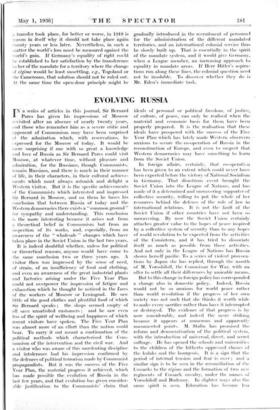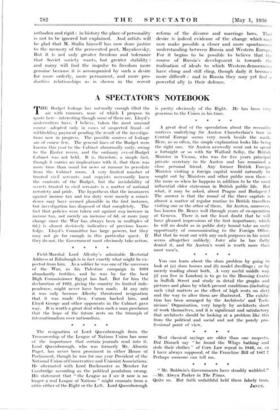EVOLVING RUSSIA
x a series of articles in this journal, Sir Bernard
I
Pares has given his impressions of Moscow revisited after an absence of nearly twenty years, and those who remember him as a severe critic and opponent of Communism may have been surprised at the admiration which, with reservations, he expressed for the Moscow of today. It would be more Surprising if one with so great a knowledge and love of Russia as Sir Bernard Pares could visit Moseow, at whatever time, without pleasure and admiration, for the Russianthough Communists, remain Russians, and there is much in their manner of life, in their characters,.in their cultural achieve- ments which must always astonish and delight a Western Visitor, But it is the specific achievements f the Communists which interested and impressed Sir Bernard in Moscow, and on them he bases his eonclUsion that betWeen Russia of today and the WeStern democracies there exists a "common ground" synipathy and understanding. This conclusion is the more interesting 'because it arises not from a theoretical belief in Communism but from an inspeetion of its works, and, especially, froM an awareness of the " wholesale " changes which have taken place in the Soviet Union in the last two years.
It is indeed doubtful whether, unless for political or theoretical reasons, anyone would have come to the same conclusion two or three years ago. A visitor then was impressed by the sense of need, of strain, of an insufficiency of food and clothing, and even an awareness of the great industrial plants and factories arising under the Five Year Plan could not overpower the impression of fatigue and exhaustion which he thought he noticed in the faces of the workers of Moscow or Leningrad. He saw little of the good clothes and plentiful food of which Sir Bernard speaks ; the shops seemed empty of all save unsatisfied customers ; and he saw even less of the spirit of wellbeing and happiness of which recent visitors have spoken. The Five Year Plan was almost more of an effort than the nation could hear. To carry it out meant a continuation of the political methods which characterised the Com- munism of the intervention and the civil war. And a visitor who was aware of this unrelenting discipline and intolerance had his impression confirmed by the defences of political terrorism made by Communist propagandists. But it was the success of the Five Year Plan, the material progress it achieved, which has made possible the evolution .of Russia in the last few years, and that evolution has given consider, able justification to the Communists' claim that ideals of personal or political freedom, of justice, of culture, of peace, can only be realised when the material and economic basis for them have been properly prepared. It is the realisation that these ideals have prospered with the success of the Five Year Plan which has lately made Western observers anxious to secure the co-operation of Russia in the reconstruction of Europe, and even to suspect that Western democracies may have something to learn from the Soviet Union.
In foreign affairs, certainly, that co-operatic:1i has been given to an extent which could never have been expected before the victory of National Socialism in Germany. That disastrous event brought the Soviet Union into the League of Nations, and has made of it a determined and unwavering supporter of collective security, willing to put the whole of her resources behind the defence of the rule of law in international relations. It is not the fault of the Soviet Union if other countries have not been so unwavering. By now the Soviet Union certainly attaches greater value to the hopes of peace inspired by a collective system of security than to any hopes of world revolution to be expected from the activities of the Comintern, and it has tried to dissociate itself as much as possible from those activities, And not only in the League of Nations has Russia shown herself pacific. To a series of violent provoca- tions by Japan she has replied, through the mouth of M. Voroshiloff, the Commissar for War, with an offer to settle all their differences by amicable means.
But to this change in foreign policy has corresponded a change also in domestic policy. Indeed, Russia would not be so anxious for world peace rather than world revolution if the progress of her own society was not such that she thinks it worth while to make every sacrifice rather than have it interrupted or destroyed. The evidence of that progress is by now considerable, and indeed the more striking because it appears at numerous and apparently unconnected points. M. Stalin has promised the reform and democratisation of the political system, with the introduction of universal, direct, and secret suffrage. He has opened the schools and universities to the children of the hitherto oppressed classes of the kulaks and the bourgeois. It is a sign that the period of internal tension and fear is over ; and a similar sign is to be seen in the reconciliation of the Cossacks to the regime and the formation of two new regiments of Cossack cavalry, under the names of Voroshiloff and .Budenny. In slighter ways also the same spirit is seen. Education has become less orthodox and rigid : in history the place of personality is not to be ignored but-explained. And artists will be glad that M. Stalin himself has now done justice to the memory of the persecuted poet, Mayakovsky. But it is not only greater freedom and tolerance . that Soviet society wants, but greater stability : . and many will find the impulse to freedom more genuine because it is accompanied by such a desire for more orderly, more permanent, and more pro- ductive relationships as is shown in the recent reform of the divorce and marriage laws. That :desire_ is indeed .evidence of the _change which may now make possible a closer and more spontaneous understanding between Russia and Western Europe. For it begins to be possible to believe that the course of Russia's development is towards the realisation of ideals to which Western democracies have clung and still cling, though daily it becomes more difficult : and in Russia they may yet find a powerful ally in their defence.















































 Previous page
Previous page